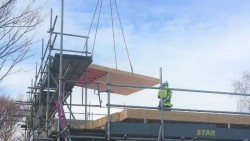Prefabricated building industry leaders have visited the Beehive to urge ministers to use their procurement muscle to set high quality benchmarks for the fledgling industry.
Such standards would mean all "offsite" home manufacturers must meet them to qualify for the Government's KiwiBuild work.
The move is backed by Prefab NZ to build confidence in prefabricated buildings assembled on site, both in the wider public and among banks, where mortgage finance is needed for the industry to take off.
"Banks won't lend for offsite manufactured buildings because they don't have sufficient security for the loan until (the building) is moved to site," Ben Rickard of building insurer Builtin said.
A set of Government procurement benchmarks set higher than minimum standards in the Building Code could also be a better quality assurance measure than replicating Britain's private sector BOPAS quality assurance scheme which has been mooted as a way of ensuring only warm, well-built prefabricated homes get built as part of KiwiBuild.
When Housing and Urban Development Minister Phil Twyford attended the Prefab NZ conference in March, he was told by one delegate that New Zealand should look to the British scheme to ensure that only quality prefabricators and assemblers were able to operate.
BOPAS, which stands for Buildoffsite Property Assurance Scheme, was the brainchild of the Buildoffsite trade association, the UK equivalent of Prefab NZ.
Like New Zealand, Britain has been struggling to build enough homes in areas of high demand like London.
The UK scheme is a mix of "assurance" and "insurance". The insurance is provided by Lloyds of London, and is effectively defects insurance, which should pay to fix any failures in construction.
The assurance is provided by an auditing programme designed to only allow prefab companies with durable products, and competent building assemblers, can join BOPAS.
The scheme was set up in consultation with the British Council of Mortgage Lenders, and made it much easier for people to get mortgages to build a prefabricated home.
But Prefab NZ's Pamela Bell did not favour a BOPAS-like scheme for New Zealand, instead asking the Government to play a role in building "assurance" around the prefab housing industry.
That would mirror fresh moves in the UK, which was having a very similar evolution to New Zealand, she said.
London mayor Sadiq Khan and the UK government were both backers of prefabricated homes, including high-rises. They were using their procurement power to stimulate investment in capacity, and were setting high minimum standards for quality.
Bell said the UK was keeping Prefab NZ up to speed on these developments.
She believed a similar plan would work in New Zealand, but it was one that would need a private sector insurance scheme, giving banks confidence that there was money available to remedy defects and covering building firm collapses, and that defects in homes they have as security for loans would be fixed.
One insurance provider readying itself to fill that void is Builtin, which is recovering from the shock of seeing CBL, the insurer of its Builtin home guarantee insurance, go into liquidation.
Builtin now uses Lloyds of London to provide the cover for its home guarantees, which provide 10-year defects protection for homeowners.
"We need a scheme that suits the particular dynamics of our market here," said Builtin's Ben Rickard. "Chief among them is the challenge for buyers of securing mortgage finance, which is what is currently holding the sector back from substantial growth."
"We're working closely with some of the major banks to advance this and we're close to launching a 'Builtin Off Site Accreditation' (BOSA) scheme for prefab builders. That's a working title.
"In essence, we conduct an independent assessment of the manufacturer's capability to build (quality assurance) alongside a review of their financial solvency (financial assurance)," he said.
Builtin's accredited prefab manufacturers would then be considered by banks to be both financially sound and competent, so that mortgage finance could be obtained from that bank for customers wanting to build with that manufacturer, Rickard said.
But, he said, the banks would want the deal insured.
"There would also be a requirement for a building warranty-type insurance to cover the potential for financial failure, essentially an insurance-backed third party guaranteeing to complete the build if something does happen to the prefab manufacturer thus protecting the bank and the customer from the extra completion costs/financial risk that might arise."
"This is not yet signed off but when, and if, it is will certainly open up the market, by giving both banks and customers confidence that the offsite manufacturer has been independently assessed against a strict set of requirements."
Original Link - stuff.co.nz









